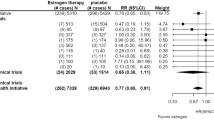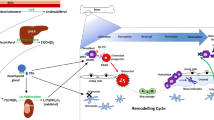Abstract
The menopause transition is associated with a two to fourfold increased risk in major depressive disorder (MDD) and clinical elevations in depressive symptoms. While the pathophysiological mechanisms underlying this increased risk remain uncertain, ovarian hormone fluctuation is believed to play a role. To the extent that this is the case, hormone replacement therapy (HRT), through its hormone-stabilizing effects, represents a viable antidepressant treatment. The current review summarizes the most recent literature evaluating the efficacy of HRT in treating MDD in peri- and postmenopausal women. In addition, to provide a clinical context in which to interpret this research, the endocrinology and clinical phenomenology related to depression with onset in the menopause transition (D-MT) are discussed. The available evidence suggests that HRT, specifically involving estrogen delivered through a skin patch, is a promising intervention in the treatment of D-MT. However, HRT of any form is an ineffective antidepressant in women who are well into the postmenopausal period.
Similar content being viewed by others
References
Papers of particular interest, published recently, have been highlighted as: • Of importance
Hale GE, Robertson DM, Burger HG. The perimenopausal woman: endocrinology and management. J Steroid Biochem Mol Biol. 2014;142(7):121–31.
Santoro N, Randolph Jr JF. Reproductive hormones and the menopause transition. Obstet Gynecol Clin N Am. 2011;38(3):455.
Harlow SD, Gass M, Hall JE, Lobo R, Maki P, Rebar RW, et al. Executive summary of the Stages of Reproductive Aging Workshop+10: addressing the unfinished agenda of staging reproductive aging. Climacteric. 2012;15(2):105–14.
Tepper PG, Randolph Jr JF, McConnell DS, Crawford SL, El Khoudary SR, Joffe H, et al. Trajectory clustering of estradiol and follicle-stimulating hormone during the menopausal transition among women in the Study of Women’s Health Across the Nation (SWAN). J Clin Endocrinol Metab. 2012;97(8):2872–80.
McKinlay SM, Brambilla DJ, Posner JG. The normal menopause transition. Maturitas. 1992;14(2):103–15.
Bromberger JT, Matthews KA, Schott LL, Brockwell S, Avis NE, Kravitz HM, et al. Depressive symptoms during the menopausal transition: the Study of Women’s Health Across the Nation (SWAN). J Affect Disord. 2007;103(1):267–72.
Woods NF, Smith-DiJulio K, Percival DB, Tao EY, Mariella A, Mitchell ES. Depressed mood during the menopausal transition and early postmenopause: observations from the Seattle midlife women’s health study. Menopause. 2008;15(2):223–32.
Freeman EW, Sammel MD, Lin H, Nelson DB. Associations of hormones and menopausal status with depressed mood in women with no history of depression. Arch Gen Psychiatry. 2006;63(4):375.
Cohen LS, Soares CN, Vitonis AF, Otto MW, Harlow BL. Risk for new onset of depression during the menopausal transition: the Harvard study of moods and cycles. Arch Gen Psychiatry. 2006;63(4):385.
Bromberger JT, Kravitz HM, Chang Y-F, Cyranowski JM, Brown C, Matthews KA. Major depression during and after the menopausal transition: Study of Women’s Health Across the Nation (SWAN). Psychol Med. 2011;41(9):1879–88.
Bromberger J, Kravitz H, Matthews K, Youk A, Brown C, Feng W. Predictors of first lifetime episodes of major depression in midlife women. Psychol Med. 2009;39(1):55.
National Institutes of Health. National Institutes of Health State-of-the-Science Conference statement: management of menopause-related symptoms. Ann Intern Med. 2005;142(12 Pt 1):1003.
Thurston RC, Blumenthal JA, Babyak MA, Sherwood A. Emotional antecedents of hot flashes during daily life. Psychosom Med. 2005;67(1):137–46.
Freeman EW, Sammel MD, Liu L, Gracia CR, Nelson DB, Hollander L. Hormones and menopausal status as predictors of depression in women in transition to menopause. Arch Gen Psychiatry. 2004;61(1):62.
Avis NE, Crawford S, Stellato R, Longcope C. Longitudinal study of hormone levels and depression among women transitioning through menopause. Climacteric. 2001;4(3):243–9.
Daly RC, Danaceau MA, Rubinow DR, Schmidt PJ. Concordant restoration of ovarian function and mood in perimenopausal depression. Am J Psychiatr. 2003;160(10):1842–6.
Bloch M, Schmidt PJ, Danaceau M, Murphy J, Nieman L, Rubinow DR. Effects of gonadal steroids in women with a history of postpartum depression. Am J Psychiatr. 2000;157(6):924–30.
Schmidt PJ, Nieman LK, Danaceau MA, Adams LF, Rubinow DR. Differential behavioral effects of gonadal steroids in women with and in those without premenstrual syndrome. N Engl J Med. 1998;338(4):209–16.
De Leo V, Lanzetta D, Morgante G, De Palma P, D’Antona D. Inhibition of ovulation with transdermal estradiol and oral progestogens in perimenopausal women. Contraception. 1997;55(4):239–43.
Girdler SS, Hinderliter AL, Wells EC, Sherwood A, Grewen KM, Light KC. Transdermal versus oral estrogen therapy in postmenopausal smokers: hemodynamic and endothelial effects. Obstet Gynecol. 2004;103(1):169–80.
Bukulmez O, Al A, Gurdal H, Yarali H, Ulug B, Gurgan T. Short-term effects of three continuous hormone replacement therapy regimens on platelet tritiated imipramine binding and mood scores: a prospective randomized trial. Fertil Steril. 2001;75(4):737–43.
Ross L, Alder E, Cawood RH, Brown J, Gebbie AE. Psychological effects of hormone replacement therapy: a comparison of tibolone and a sequential estrogen therapy. J Psychosom Obstet Gynecol. 1999;20(2):88–96.
Soares CN, Arsenio H, Joffe H, Bankier B, Cassano P, Petrillo LF, et al. Escitalopram versus ethinyl estradiol and norethindrone acetate for symptomatic peri-and postmenopausal women: impact on depression, vasomotor symptoms, sleep, and quality of life. Menopause. 2006;13(5):780–6.
Cohen LS, Soares CN, Poitras JR, Prouty J, Alexander AB, Shifren JL. Short-term use of estradiol for depression in perimenopausal and postmenopausal women: a preliminary report. Am J Psychiatr. 2003;160(8):1519–22.
de Novaes SC, Almeida OP, Joffe H, Cohen LS. Efficacy of estradiol for the treatment of depressive disorders in perimenopausal women: a double-blind, randomized, placebo-controlled trial. Arch Gen Psychiatry. 2001;58(6):529.
Schmidt PJ, Nieman L, Danaceau MA, Tobin MB, Roca CA, Murphy JH, et al. Estrogen replacement in perimenopause-related depression: a preliminary report. Am J Obstet Gynecol. 2000;183(2):414–20. This position statement provides an excellent summary of our current understanding of the risks and benefits of HRT in relation to health and disease.
Joffe H, Petrillo LF, Koukopoulos A, Viguera AC, Hirschberg A, Nonacs R, et al. Increased estradiol and improved sleep, but not hot flashes, predict enhanced mood during the menopausal transition. J Clin Endocrinol Metab. 2011;96(7):E1044–54.
Joffe H, Hall JE, Gruber S, Sarmiento IA, Cohen LS, Yurgelun-Todd D, et al. Estrogen therapy selectively enhances prefrontal cognitive processes: a randomized, double-blind, placebo-controlled study with functional magnetic resonance imaging in perimenopausal and recently postmenopausal women. Menopause. 2006;13(3):411–22. This manuscript describes the most recent RCT of transdermal estradiol in the treatment of depression in peri- and early postmenopausal women.
Rogines-Velo MP, Heberle AE, Joffe H. Effect of medroxyprogesterone on depressive symptoms in depressed and non-depressed perimenopausal and postmenopausal women following discontinuation of transdermal estradiol therapy. Menopause. 2012;19(4):471. This is the most recent study examining the mood effects of P4 supplementation and one of the few that includes depressed women.
Yalamanchili V, Gallagher JC. Treatment with hormone therapy and calcitriol did not affect depression in elderly postmenopausal women: no interaction with estrogen and vitamin D receptor genotype polymorphisms. Menopause. 2012;19(6):697.
Demetrio FN, Rennó Jr J, Gianfaldoni A, Gonçalves M, Halbe HW, Filho AH, et al. Effect of estrogen replacement therapy on symptoms of depression and anxiety in non-depressive menopausal women. Arch Women’s Ment Health. 2011;14(6):479–86.
Morrison MF, Kallan MJ, Ten Have T, Katz I, Tweedy K, Battistini M. Lack of efficacy of estradiol for depression in postmenopausal women: a randomized, controlled trial. Biol Psychiatry. 2004;55(4):406–12.
Kornstein SG, Toups M, Rush AJ, Wisniewski SR, Thase ME, Luther J, et al. Do menopausal status and use of hormone therapy affect antidepressant treatment response? Findings from the sequenced treatment alternatives to relieve depression (STAR*D) study. J Women’s Health. 2013;22(2):121–31.
Writing Group for the Women’s Health Initiative Investigators. Risks and benefits of estrogen plus progestin in healthy postmenopausal women: principal results from the Women’s Health Initiative randomized controlled trial. J Am Med Assoc. 2002;288(3):321–33.
Chlebowski RT, Hendrix SL, Langer RD, Stefanick ML, Gass M, Lane D, et al. Influence of estrogen plus progestin on breast cancer and mammography in healthy postmenopausal women: the women’s health initiative randomized trial. J Am Med Assoc. 2003;289(24):3243–53.
Schmidt P. The 2012 hormone therapy position statement of the North American Menopause Society. Menopause. 2012;19(3):257.
Santen RJ, Allred DC, Ardoin SP, Archer DF, Boyd N, Braunstein GD, et al. Postmenopausal hormone therapy: an Endocrine Society scientific statement. J Clin Endocrinol Metab. 2010;95(7 supplement 1):s1–66.
Rossouw JE, Prentice RL, Manson JE, Wu L, Barad D, Barnabei VM, et al. Postmenopausal hormone therapy and risk of cardiovascular disease by age and years since menopause. J Am Med Assoc. 2007;297(13):1465–77.
Manson JE, Allison MA, Rossouw JE, Carr JJ, Langer RD, Hsia J, et al. Estrogen therapy and coronary-artery calcification. N Engl J Med. 2007;356(25):2591–602.
Canonico M, Oger E, Plu-Bureau G, Conard J, Meyer G, Lévesque H, et al. Hormone therapy and venous thromboembolism among postmenopausal women impact of the route of estrogen administration and progestogens: the ESTHER study. Circulation. 2007;115(7):840–5.
Smith NL, Blondon M, Wiggins KL, Harrington LB, van Hylckama VA, Floyd JS, et al. Lower risk of cardiovascular events in postmenopausal women taking oral estradiol compared with oral conjugated equine estrogens. JAMA Intern Med. 2014;174(1):25–31.
L’hermite M. HRT optimization, using transdermal estradiol plus micronized progesterone, a safer HRT. Climacteric. 2013;16(S1):44–53.
Adams MR, Register TC, Golden DL, Wagner JD, Williams JK. Medroxyprogesterone acetate antagonizes inhibitory effects of conjugated equine estrogens on coronary artery atherosclerosis. Arterioscler Thromb Vasc Biol. 1997;17(1):217–21.
Goodman MP. Are all estrogens created equal? A review of oral vs. transdermal therapy. J Women’s Health. 2012;21(2):161–9.
Wharton W, Gleason CE, Miller VM, Asthana S. Rationale and design of the Kronos Early Estrogen Prevention Study (KEEPS) and the KEEPS Cognitive and Affective sub study (KEEPS Cog). Brain Res. 2013;1514:12–7. This manuscript summarizes the rationale and design of the cognitive and affective substudy of the Kronos Early Estrogen Prevention Study (KEEPS Cog), an RCT evaluating the mood benefits of conjugated equine estrogen and transdermal estradiol. In doing so, it summarizes many of the key issues that are currently of interest in the field of perimenopausal depression treatment.
Acknowledgments
This work was supported by NIH grant RO1-MH087619. Dr. Gordon is also the recipient of a Postdoctoral Fellowship of the Fonds de la Recherche du Québec–Santé (FRQS).
Compliance with Ethics Guidelines
ᅟ
Conflict of Interest
Jennifer L. Gordon has received a grant from the Fonds de la Recherche du Québec – Santé (FRQS).
Susan S. Girdler has received a grant from the National Institute of Health, R01-MH087619.
Human and Animal Rights and Informed Consent
This article does not contain any studies with human or animal subjects performed by any of the authors.
Author information
Authors and Affiliations
Corresponding author
Additional information
This article is part of the Topical Collection on Women’s Mental Health
Rights and permissions
About this article
Cite this article
Gordon, J.L., Girdler, S.S. Hormone Replacement Therapy in the Treatment of Perimenopausal Depression. Curr Psychiatry Rep 16, 517 (2014). https://doi.org/10.1007/s11920-014-0517-1
Published:
DOI: https://doi.org/10.1007/s11920-014-0517-1




